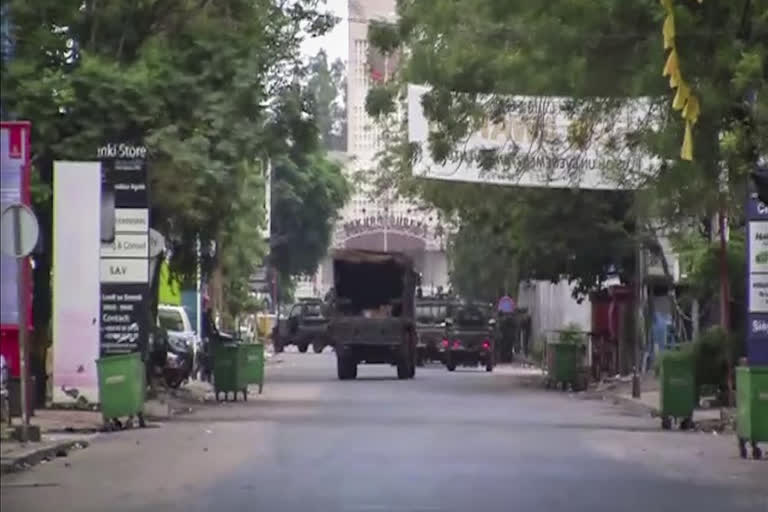Hyderabad: Mutinous soldiers in the West African nation of Guinea detained President Alpha Conde after hours of heavy gunfire rang out near the presidential palace in the capital, then announced on state television that the government had been dissolved in an apparent coup d’etat. The country’s borders were closed and its constitution was declared invalid in the announcement read aloud on state television by army Col. Mamadi Doumbouya, who told Guineans: “The duty of a soldier is to save the country."
The junta later announced plans to replace Guinea’s governors with regional commanders at an event Monday and warned: Any refusal to appear will be considered rebellion against the country’s new military leaders.
The U.S. State Department warned against violence and urged authorities in Guinea to avoid “extra-constitutional actions that will only erode Guinea’s prospects for peace, stability, and prosperity. Spokesman Ned Price added in a statement that the junta’s actions could limit the ability of the United States and Guinea’s other international partners to support the country.
Conde’s whereabouts had been unknown for hours after the intense fighting Sunday in downtown Conakry until a video emerged showing the 83-year-old leader tired and dishevelled in military custody.
Guinea has had a long history of political instability. In 1984, Lansana Conte took control of the country after the first post-independence leader died. He remained in power for a quarter-century until his death in 2008, accused of siphoning off state coffers to enrich his family and friends.
The country’s second coup soon followed, putting army Capt. Moussa “Dadis” Camara in charge. During his rule, security forces opened fire on demonstrators at a stadium in Conakry who were protesting his plans to run for president. Human rights groups have said more than 150 people were killed and at least 100 women were raped. Camara later went into exile after surviving an assassination attempt, and a transitional government organized the landmark 2010 election won by Conde.
Also read:
COUP D’ETAT in 2021
Guinea: September 5, 2021: Mamady Doumbouya overthrows Alpha Conde
Afghanistan: August 15, 2021: Withdrawal of U.S. forces allows the 2021 Taliban offensive to overthrow the government of Ashraf Ghani and reinstate the Islamic Emirate of Afghanistan
Tunisia:July 25, 2021: Kais Saied suspended parliament to take all powers in one hand.
Tunisia, North African country witnessed President Kais Saied freezing the Parliament. Saied announced that he will temporarily rule by decree. After the announcement, a nationwide curfew was announced the next day for 30 days. In a stern remark and threat, Saied declared that corrupt parliamentarians will be subject to the law “despite their wealth and positions.” Tunisia's young democracy is put to test similar to the protest in 2013 that nearly derailed its initial transition. Experts are keen on to watch whether it remain the world's only Arab democracy or a “self-coup” or incumbent takeover.
Saied, an independent law professor, assumed prominence with his landslide victory in 2019 presidential elections. However, the 2014 constitution put forth a semi-presidential system wherein President would share power with Prime Minister whose authority is bestowed through Parliament. With President Saied, Prime Minister Hichem Mechichi, and parliamentary speaker Rached Ghannouchi at loggerheads amid a sluggish economy, Tunisia witnessed political malaise. Saied's actions have been condemned as unconstitutional by Islamist parties Ennahda and the Karama Coalition and the secular parties Qalb Tounes and the Democratic Current.
Mali: May 25, 2021: Malian coup d'état: Military overthrows Bah N'daw
Bah Ndaw, Malian transitional president and Moctar Ouane, prime minister were arrested by armed forces on May 24. Later, the duo resigned as per the military junta, known as the National Committee for the Salvation of the People (CNSP)
After coup d' eat in August 18, 2020, Mali has been under a transitional government. Erstwhile President Ibrahim Boubacar Keita was overthrown by the military back then. The military junta disappointed people as it seemed to repeat the system it overthrew.
El Salvador: May 1, 2021: Self-coup by the Legislative Assembly
On May 1, 2021, the Legislative Assembly of El Salvador voted to oust several judges from the Supreme Court. The Attorney General of El Salvador was also removed. Those opposing presidency of Nayib Bukele were removed. News reports stated the event as a self-coup by the opposition. It should also be noted that self-coup hit headlines in 2020 also, where Bukele ordered soldiers into the Legislative Assembly.
Jordan: April 3, 2021: Failed coup attempt by Prince Hamzah bin Hussein to overthrow his half-brother, King Abdullah II
The placid image of Jordan being a secure and stable country in the Middle East was upended as the rift between King Abdullah II and a former crown prince Hamzah bin Hussein widened. Foreign Minister came to the fore accusing Hamzah and another member of the royal family of corruption and the nation's destabilization. A video released by Hamzah later revealed that he was under house arrest.
Armenia: February 25, 2021: Armenian military calls for Prime minister Nikol Pashinyan to resign
Armenian Prime Minister Nikol Pashinyan on February 25 announced his resignation before thousands who flocked in support of him in capital Yerevan. "The situation is tense, but we must agree that there cannot be clashes," Pashinyan told his supporters through a megaphone, adding that the new political instability that follows months of protests against his rule was "manageable". 10,000 demonstrators were calling on Pashinyan to step down, a kilometre apart.
Myanmar: February 1, 2021: Aung San Suu Kyi overthrown
The beginning of the year witnessed coup d'état in Myanmar. Myanmar's military, Tatmadaw deposed the National League for Democracy (NLD), the ruling party of Myanmar on February 1. One year of emergency was declared and a new election is to be held by the end of the emergency. State Counsellor Aung San Suu Kyi was detained, along with ministers, their deputies and members of Parliament.



